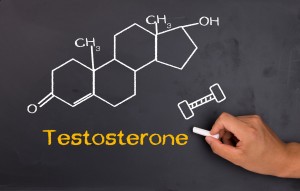By Anthoney J. Andersen – Steroidal.com
If you’re a bodybuilder or fitness enthusiast, then you know that proper nutrition is just as important as strength training when it comes to building and maintaining lean muscle. Many people turn to supplementation (protein bars/powders, creatine, etc.) to assist their body in the development of muscle mass.
One of the driving factors behind building muscle mass is through the increase of the male hormone – testosterone. When you hear the word “testosterone,” you might picture Mr. Universe contestants, demonstrating their massive cable-like veins and bulging biceps.
The most common ways to increase your testosterone levels is through the use of anabolic steroids. You’re probably aware that not only can anabolic steroids pose dangerous health risks, but they are also illegal in the United States.
So, are there ways to naturally increase your body’s testosterone levels without the use of supplementation?
Let’s find out.
TESTOSTERONE 101
Testosterone is a hormone found in humans, as well as in other animals. The testicles primarily produce testosterone in men, while the ovaries produce testosterone in women (though in much smaller amounts). Testosterone begins to spike during puberty, and starts to dip after the age of 30.
Testosterone is often associated with sex drive, and plays a vital role in sperm production. However, it can also affect bone and muscle mass, the way men store body fat and even red blood cell production.
A man’s testosterone levels can also affect his mood. According to Healthline.com, a drop in testosterone levels can contribute to:
- Moodiness
- Weight gain
- Loss of muscle mass
- Diminished libido
Testosterone levels can be checked with a simple blood test. Men whose natural testosterone production has dropped significantly can use artificial testosterone to help treat their “low T.” Testosterone replacement therapy does come with both risks and benefits.
GIVE YOUR BODY THE BOOST IT DESERVES
As mentioned earlier, your testosterone begins to dip after the age of 30, and continues to decline as you age. Low T can lead to a loss of libido, erectile dysfunction, low mood and problems with concentration and memory.
According to Menshealth.com, a study was conducted by Christina Wang M.D., of the University of California at Los Angeles, where she took a group of men who were experiencing feelings of edginess, anger, irritability and aggression.
After two months of testosterone replacement treatment to bring their T to normal levels, their anger and agitation decreased, and their sense of optimism and friendliness heightened.
According to MedicineNet.com, the normal range of testosterone in males is about 270 to 1070 ng/dl, with an average level of 679 ng/dl. A normal male testosterone level usually peaks at the age of 20, and then slowly declines. Testosterone levels above or below the normal range are considered to be out of balance.
Some researchers suggest that the healthiest men have testosterone levels between 400 to 600 ng/dl.
Testosterone also plays a vital role in building muscle and fighting fat. Healthy T levels can help the body repair muscle tissue broken down during exercise, increasing your body’s chances of building and maintaining muscle mass. Once the body’s T levels begin to decline after age 30, a hormone called lipoprotein lipase (LPL) increases. Raised LPL levels can cause the body to store more body fat, with less being used for energy.
THE SOLUTION IS IN YOUR SUPERMARKET
If you’re looking to increase your body’s testosterone levels, then you should first examine your daily habits.
“I never prescribe testosterone alone without talking to men about their diet and lifestyle,” says Martin Miner, M.D., co-director of the Men’s Health Center at the Miriam Hospital in Providence, RI.
BREAKFAST FOR CHAMPIONS
You may have heard at some point in your life that breakfast is the most important meal of the day, and that it should not be glossed over and taken lightly. Testosterone is produced in the body by cholesterol. In a study in the Journal of Clinical Endocrinology & Metabolism, men ate more than 100 grams of fat per day for two weeks.
The results concluded that the men had less of a hormone that binds to testosterone, called sex-hormone-binding globulin. As a result, they had higher levels of free testosterone – the only form of T that’s ready to work on your tissue.
Some of the good fat sources include nuts, meat and eggs. Nuts are high in testosterone-elevating omega-3 fatty acids. And since testosterone is synthesized from cholesterol, eggs are a great breakfast option as well.
THE POWER OF VITAMIN D
Vitamin D is a nutrient that helps the body absorb calcium. It’s vital to the health of bones, the immune system and many other important functions in the body, including testosterone production.
According to Healthline.com, one study found that low testosterone was linked to vitamin D deficiency in European men. Another study found that healthy, overweight men, who were involved in a weight reduction program, had higher testosterone levels after receiving vitamin D every day for a year. Men in the placebo group saw no significant change in their T levels.
OYSTERS & TUNA
Zinc is an essential nutrient during puberty, and its effects can keep male hormones in check throughout adulthood. Men with low T can benefit from taking zinc supplements, as well as consuming certain seafood items like oysters. Oysters have high levels of zinc, and can help increase the testosterone levels in men with low T.
Tuna is another essential food item due to its high level of vitamin D and omega-3 fatty acids. It’s also a high-protein, low calorie food that is vital to maintaining a healthy heart. Whether you eat it canned or fresh, a serving of tuna fulfills your daily vitamin D requirements.
LIFESTYLE CHANGES
Aside from tweaking your diet, experts have found that making some simple life changes may also be beneficial to your overall health, while increasing the natural production of testosterone.
A GOOD NIGHT’S SLEEP
George Yu, M.D., a urology professor at the George Washington University Medical Center in Washington D.C., says that, for many men with low testosterone, poor sleep habits may be one of the contributing factors. A lack of sleep affects a variety of hormones and chemicals in your body. This in turn, can have a harmful impact on your testosterone production.
Making sleep a priority – aiming for seven to eight hours a night – is crucial for your body’s overall health, adds Dr. Yu.
MAINTAIN A HEALTHY WEIGHT
Men, who are overweight or obese, tend to have low testosterone levels, says Alvin M. Matsumoto, M.D., of the University of Washington School of Medicine in Seattle. For those men, losing the extra weight can help return testosterone back to its normal level of production.
AN ACTIVE LIFESTYLE
It’s no secret that remaining active when you get older plays a pivotal role in making sure that your body is functioning at peak performance. According to WebMD, testosterone adapts to your body’s needs. If you spend most of your days lying on the couch watching television, your brain receives the message that you don’t need as much to bolster your muscles and bones.
However, when you’re physically active, your brain sends out the signal for more of the hormone. If you’re a person who is engaging in little to no exercise at the moment, Dr. Miner suggests starting by:
- Walking at least 10 to 20 minutes a day.
- Building strength with several sessions of weights or elastic bands each week. Be sure to work with a trainer, so you can adopt proper form and technique, so you don’t injure yourself.
Keep in mind that overtraining your muscles can have a negative effect on your body because it will increase cortisol – a stress hormone that competes with testosterone and breaks down muscle. Research at the University of North Carolina found that excessive exercise can lower your testosterone levels by as much as 40 percent.
Resting your body is not considered indolent; it’s simply part of the process for maintaining a healthy lifestyle.








